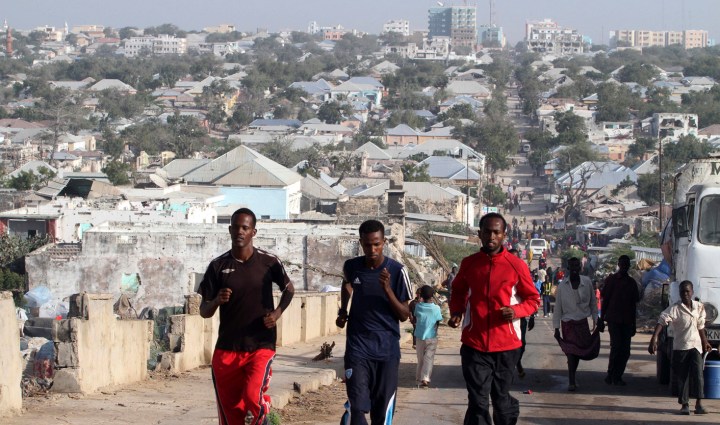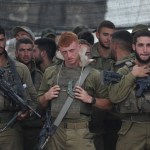Training in a bullet-riddled stadium where the remains of a rocket propelled grenade lies discarded on the track's edge counts as progress for Somali Olympic hopeful Mohamed Hassan Mohamed. By Richard Lough (Reuters)
A year ago, Mogadishu’s Konis stadium was a base for Islamist militants and a work out meant at times running through the streets, dodging gun-fire and mortar shells in one of the world’s most dangerous cities.
“It’s easier for us to train now,” said Mohamed.
It is a staggering understatement from the 22-year-old, one of four Somali athletes vying for the two slots guaranteed for Somalia at the London games.
For 20 years the capital’s rutted roads were the frontline in running battles between feuding warlords and later Islamist insurgents fighting to overthrow a government propped up by foreign forces and cash.
The Konis stadium served as an al Shabaab rebel training camp until the al Qaeda-linked combatants fled the capital in August last year. Bullet holes pepper the stadium’s concrete stands, which lie in mounds of rubble in places.
Progress, however, is relative. Somalia’s Olympic bid is run on a shoestring. There are no dedicated personal trainers, physiotherapists or nutritionists.
“Our facilities are poor. We don’t have a modern training camp or a modern gym. We should replace our running shoes frequently. Instead, we wash them,” said Mohamed.
OLYMPIC CHIEF KILLED
For now, the 1,500 metre specialist trains in relative safety, unless the security forces block off the surrounding area in advance of a government delegation on the move, forcing the athletes back onto the streets.
That means competing for space with patrolling armoured troop carriers, donkey carts and mountainous piles of garbage. Roadside bombs have become a growing danger.
In April, a suicide bomber blew herself up at a ceremony in the city’s national theatre, killing the popular head of Somalia’s Olympic committee and at least five others.
“The theatre blast was a painful incident. It was a shocking day,” Mohamed said.
Somalia has never won a medal at the Olympic games.
Its best performance was in 1996 when its most renowned athlete, Abdi Bile, took sixth place in the 1,500 metres in Atlanta.
At the time, militia fighters in the lawless capital dubbed their machine gun-mounted pickup trucks “Abdi Biles” in a typically Somali mark of respect for the runner’s power and speed.
Somalia is not expected to announce the names of the two athletes who will compete in London until later this month. Unveiling their identities earlier might endanger their lives in a country plagued by kidnappings and targeted killings.
RUN UNTIL YOU DROP
Rarely able to travel to international meets, no Somali athlete qualified for the London Games outright. Each national Olympic committee is eligible for two guaranteed places – one for a man, one for a woman – in athletics.
“Pump your arms. Pump your arms with power,” urged the Somali team coach, Ahmed Ali Abukar, armed with nothing more than a stopwatch.
“Don’t slow up. Keep going until you drop,” he yelled as sweat gleamed on Mohamed’s sinewy body.
Abukar earns a salary of just $150 a month. That comes out of a $2,000 per month pot from the Somali Olympic Committee (SOC) that pays for the four athletes’ accommodation in a renovated school classroom, their food and transport costs.
Kadija Dahir, president of the Somali Athletics Federation, said a request to the SOC for a further $3,500 a month to fund the training of two athletes failed.
“We need money to produce quality athletes,” Dahir said. “With that money we wanted to do high altitude training in Ethiopia and buy better clothing and trainers.”
Zamzam Mohamud Farah kneels towards Mecca and prays before taking to the hard-packed dirt track in a pair of heavy trainers, baggy tracksuit bottoms and an orange bandana.
One of two women competing for a wildcard entry, she puts her personal best at around 58 seconds in the 400 metres.
The Women’s world record stands at 47.60, a gaping difference that leaves her unlikely to contest a podium finish.
In a fractured country fighting to end 20 years of civil conflict, a medal, though, is hardly the point.
“I would not be going there to win, but for pride,” Farah said. “I would be representing my flag, my soil and its people.”
Photo: Somali athletes run along a street as they train during preparations for the 2012 London Olympic Games in Somalia’s capital Mogadishu, in this March 14, 2012 file photo. Training in a bullet-riddled stadium where the remains of a rocket propelled grenade lies discarded on the track’s edge counts as progress for Somali Olympic hopeful Mohamed Hassan Mohamed. A year ago, Mogadishu’s Konis stadium was a base for Islamist militants and a work out meant at times running through the streets, dodging gun-fire and mortar shells in one of the world’s most dangerous cities. REUTERS/Feisal Omar





















 Become an Insider
Become an Insider